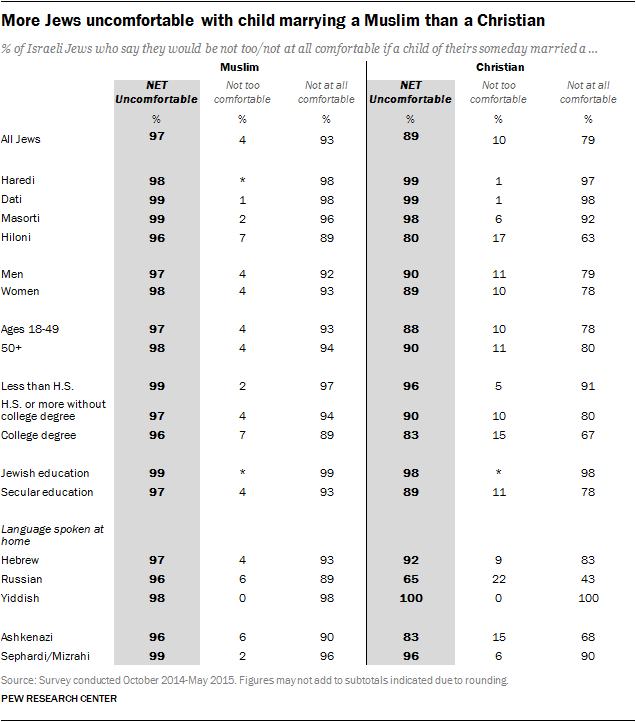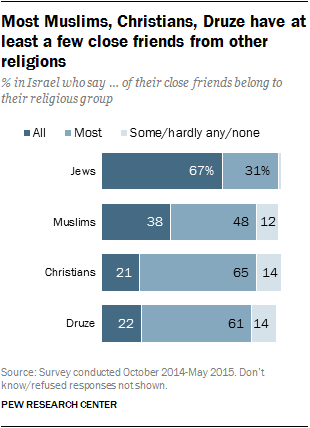Members of Israel’s major religious groups tend to be isolated from one another socially. When it comes to friendships as well as family relationships, Jews, Muslims, Christians and Druze often stay within their own religious communities. For example, 98% of Jews say most or all of their close friends are Jewish, and 85% of Muslims say most or all of their close friends are Muslim.
Israeli Christians and Druze, both small minorities of Israel’s population, are somewhat more likely to form close friendships with people outside their own religious community; only about one-in-five in each group say all of their close friends are from within their own religious group. Still, majorities of Christians and Druze say most of their friends share their religion.
Even within Israeli Jewry, different subgroups (Haredim, Datiim, Masortim and Hilonim) tend to be isolated from each other – in some cases starkly. Particularly among Haredim and Hilonim, the ultra-Orthodox and secular groups at opposite ends of the religious spectrum, relatively few adults say they have many close friends from outside their respective communities. And the two groups are strongly opposed to intermarriage between their communities; 93% of Hilonim say they would not be comfortable if a child of theirs someday married a Haredi Jew, and 95% of Haredim say they would not be comfortable if a child of theirs were to marry a secular Jew.
Intermarriage uncommon in Israel
 Religious intermarriage is exceedingly rare among Jews in Israel. Only about 2% of Jews who are married or living with a romantic partner say they have a spouse or partner who belongs to a non-Jewish faith or is religiously unaffiliated.
Religious intermarriage is exceedingly rare among Jews in Israel. Only about 2% of Jews who are married or living with a romantic partner say they have a spouse or partner who belongs to a non-Jewish faith or is religiously unaffiliated.
Religious intermarriages are not conducted in Israel, but marriages between members of different faiths conducted in other countries are recognized in Israel. (For more on this topic, see a sidebar on marriage and divorce in Israel in Chapter 10.)
Nearly all married Jews across different age groups and ethnic and religious backgrounds say they have a Jewish spouse.
Jews who speak primarily Russian at home are more likely than others to have a non-Jewish spouse. Roughly one-in-ten married or partnered Russian-speaking Jews (11%) say they have a non-Jewish spouse, including 7% who have a religiously unaffiliated spouse and 4% who are married to a Christian.
Religious intermarriage also is very uncommon among Muslims, Christians and Druze in Israel; among respondents from these groups who are married or living with a partner, 1% or fewer say they have a spouse or partner from outside their respective religious group.
Intermarriages uncommon across Jewish groups
The vast majority of Jews in Israel who are married or living with a partner (84%) have a spouse or partner belonging to their own Jewish subgroup.
Among Haredim and Hilonim, in particular, relatively few adults are married to spouses who identify with a different Jewish group. About nine-in-ten married Haredi Jews (95%) say their spouse is Haredi, and 93% of married or cohabiting Hilonim have a Hiloni spouse/partner.
Marriage across Jewish groups is somewhat more common among Masortim and Datiim. Roughly one-third of married or cohabiting Masortim (36%) say their partner is from another Jewish group, including 20% who are married to a Dati spouse and 15% who have a Hiloni spouse/partner. About one-in-five Datiim say their spouse or partner belongs to another Jewish subgroup, including 10% who are married to a Masorti spouse.
Jews uncomfortable with their child marrying a Muslim, Christian
Across different cultural, ethnic and demographic groups, Jews are nearly universally uncomfortable with the idea of their child someday marrying a Muslim (97%). A somewhat smaller – but still very large – proportion of Jews (89%) feel the same way about a hypothetical intermarriage with a Christian.
This difference is driven by Hilonim, who are slightly less opposed to intermarriage with a Christian compared with other Jewish groups. Eight-in-ten Hilonim (80%) say they would be uncomfortable with a Christian marrying into their family, while virtually all Haredim, Datiim and Masortim say this. An overwhelming majority of Hilonim (96%) say they are uncomfortable with the idea of a child marrying a Muslim.
Israeli Jews who speak primarily Russian at home are less likely than those who speak Hebrew to oppose their child marrying a Christian (65% vs. 92%), but they are just as likely as Hebrew speakers to be uncomfortable with a Muslim marrying into their family (96% vs. 97%).
Large majorities of Muslims, Christians and Druze say they are opposed to their child someday marrying outside their religious community, regardless of the hypothetical spouse’s religion.
About eight-in-ten Muslims (82%) say they are not too or not at all comfortable with the idea of intermarriage with a Jew. When it comes to intermarriage with a Christian, a somewhat smaller share of Muslims (75%) say they are uncomfortable with the idea.
Roughly nine-in-ten Christians (88%) say they would be not too comfortable (9%) or not at all comfortable (79%) with their child marrying a Jew, and eight-in-ten (80%) say they would be uncomfortable if a Muslim married into the family.
Druze are about equally uncomfortable with the prospect of a child of theirs marrying a Jew (87%), Muslim (85%) or Christian (87%). The survey did not ask other groups how they feel about their child someday marrying a Druze spouse.
Vast majority of Haredim, Hilonim opposed to intermarriage between their communities
Not only do Israeli Jews feel uncomfortable with the idea of their child marrying a Muslim or a Christian, but they generally express discomfort with the idea of their child someday marrying a Jew from outside their own religious subgroup. For instance, an overwhelming majority of Haredim (95%) say they would be not too (17%) or not at all (78%) comfortable if a child of theirs someday married a Hiloni Jew. Likewise, roughly nine-in-ten Hilonim say they would be uncomfortable if their child someday married a Haredi Jew.
As noted in the Overview of this report, Hilonim are more uncomfortable with the notion that a child of theirs might marry a Haredi Jew than they are with the idea of their child marrying a Christian. Fully 80% of Hilonim say they would be either not at all comfortable (63%) or not too comfortable (17%) if their child married a Christian. But 93% of Hilonim say they would be either not at all comfortable (73%) or not too comfortable (20%) with their child marrying a Haredi Jew.
Generally, Jews express lower levels of discomfort with the idea of their children marrying into a community that is closer to their own in terms of religious belief and practice. At least relative to marrying a Hiloni Jew, fewer Haredim say they would be uncomfortable with their child marrying a Dati Jew. Nevertheless, a majority of Haredim (58%) would be uncomfortable with this scenario.
Many Datiim are open to the idea of their child someday marrying a Haredi or Masorti Jew; minorities of Datiim say they would be uncomfortable with such occurrences (35% and 41%, respectively). But roughly eight-in-ten Datiim (81%) express discomfort with a Hiloni Jew marrying into the family.
Among Masortim, a majority (69%) are uncomfortable with intermarriage with Haredim, but fewer express discomfort with their child someday marrying a Dati (34%) or Hiloni (35%) Jew.
Hilonim are generally opposed to the idea of their child marrying an Orthodox Jew of any kind, but fewer (45%) say they are uncomfortable with a child of theirs someday marrying a Masorti Jew.
Close friendships uncommon across religious lines
 Jewish respondents nearly universally say their close friends also are Jewish (98%), including 67% who say all of their friends are Jewish and 31% who say most of their friends are Jewish.
Jewish respondents nearly universally say their close friends also are Jewish (98%), including 67% who say all of their friends are Jewish and 31% who say most of their friends are Jewish.
Virtually all Haredim (99%), Datiim (99%), Masortim (99%) and Hilonim (97%) say all or most of their friends are Jewish. This pattern is consistent among Jews belonging to different age groups and those with higher and lower levels of education.
Jews are significantly more likely than Israel’s minority groups to say all their close friends belong to their own community. Two-thirds of Jews say this, compared with 38% of Muslims and roughly one-in-five Christians and Druze. In fact, among Muslims, Christians and Druze, roughly one-in-ten adults say only some or hardly any of their close friends are from their own religious community. This may partly reflect the fact that Muslims, Christians and Druze form significantly smaller communities in Israel.
Still, like Jews, large majorities of Muslims (85%), Christians (86%) and Druze (83%) say at least most of their close friends share their religion.33
Relatively few Jews have many close friends from other Jewish groups
Few Haredim or Hilonim say they have many friends from outside their religious group. Roughly nine-in-ten Haredim (89%) say all or most of their close friends are also Haredi Jews; likewise, 90% of Hilonim say all or most of their friends are secular.
Friendships across religious backgrounds are somewhat more common for Datiim and Masortim. Three-in-ten Datiim (30%) say all or most of their friends are Masortim, while about one-in-five Masorti Jews (18%) say all or most of their close friendships are with Datiim. Another 36% of Masortim say all or most of their close friends are Hilonim; only about half of Masortim (48%) say all or most of their friends are also Masortim.
Masorti men are four times as likely as Masorti women (28% vs. 7%) to say all or most of their close friendships are with Datiim.









